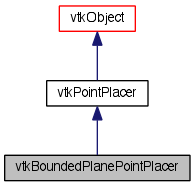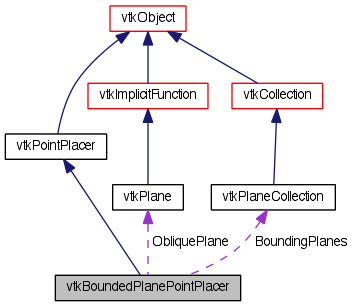a placer that constrains a handle to a finite plane More...
#include <vtkBoundedPlanePointPlacer.h>


Detailed Description
a placer that constrains a handle to a finite plane
vtkBoundedPlanePointPlacer is a type of point placer that constrains its points to a finite (i.e., bounded) plance.
Definition at line 40 of file vtkBoundedPlanePointPlacer.h.
Member Typedef Documentation
Standard methods for instances of this class.
Reimplemented from vtkPointPlacer.
Definition at line 48 of file vtkBoundedPlanePointPlacer.h.
Member Enumeration Documentation
| anonymous enum |
Definition at line 102 of file vtkBoundedPlanePointPlacer.h.
Constructor & Destructor Documentation
| vtkBoundedPlanePointPlacer::vtkBoundedPlanePointPlacer | ( | ) | [protected] |
| vtkBoundedPlanePointPlacer::~vtkBoundedPlanePointPlacer | ( | ) | [protected] |
Member Function Documentation
| static vtkBoundedPlanePointPlacer* vtkBoundedPlanePointPlacer::New | ( | ) | [static] |
Instantiate this class.
Reimplemented from vtkPointPlacer.
| static int vtkBoundedPlanePointPlacer::IsTypeOf | ( | const char * | type | ) | [static] |
Standard methods for instances of this class.
Reimplemented from vtkPointPlacer.
| virtual int vtkBoundedPlanePointPlacer::IsA | ( | const char * | type | ) | [virtual] |
Standard methods for instances of this class.
Reimplemented from vtkPointPlacer.
| static vtkBoundedPlanePointPlacer* vtkBoundedPlanePointPlacer::SafeDownCast | ( | vtkObjectBase * | o | ) | [static] |
Standard methods for instances of this class.
Reimplemented from vtkPointPlacer.
| virtual vtkObjectBase* vtkBoundedPlanePointPlacer::NewInstanceInternal | ( | ) | const [protected, virtual] |
Standard methods for instances of this class.
Reimplemented from vtkPointPlacer.
Standard methods for instances of this class.
Reimplemented from vtkPointPlacer.
| void vtkBoundedPlanePointPlacer::PrintSelf | ( | ostream & | os, |
| vtkIndent | indent | ||
| ) | [virtual] |
Standard methods for instances of this class.
Reimplemented from vtkPointPlacer.
| virtual void vtkBoundedPlanePointPlacer::SetProjectionNormal | ( | int | ) | [virtual] |
Set the projection normal to lie along the x, y, or z axis, or to be oblique. If it is oblique, then the plane is defined in the ObliquePlane ivar.
| virtual int vtkBoundedPlanePointPlacer::GetProjectionNormal | ( | ) | [virtual] |
Set the projection normal to lie along the x, y, or z axis, or to be oblique. If it is oblique, then the plane is defined in the ObliquePlane ivar.
| void vtkBoundedPlanePointPlacer::SetProjectionNormalToXAxis | ( | ) | [inline] |
Set the projection normal to lie along the x, y, or z axis, or to be oblique. If it is oblique, then the plane is defined in the ObliquePlane ivar.
Definition at line 60 of file vtkBoundedPlanePointPlacer.h.
| void vtkBoundedPlanePointPlacer::SetProjectionNormalToYAxis | ( | ) | [inline] |
Set the projection normal to lie along the x, y, or z axis, or to be oblique. If it is oblique, then the plane is defined in the ObliquePlane ivar.
Definition at line 62 of file vtkBoundedPlanePointPlacer.h.
| void vtkBoundedPlanePointPlacer::SetProjectionNormalToZAxis | ( | ) | [inline] |
Set the projection normal to lie along the x, y, or z axis, or to be oblique. If it is oblique, then the plane is defined in the ObliquePlane ivar.
Definition at line 64 of file vtkBoundedPlanePointPlacer.h.
| void vtkBoundedPlanePointPlacer::SetProjectionNormalToOblique | ( | ) | [inline] |
Set the projection normal to lie along the x, y, or z axis, or to be oblique. If it is oblique, then the plane is defined in the ObliquePlane ivar.
Definition at line 66 of file vtkBoundedPlanePointPlacer.h.
If the ProjectionNormal is set to Oblique, then this is the oblique plane used to constrain the handle position.
| virtual vtkPlane* vtkBoundedPlanePointPlacer::GetObliquePlane | ( | ) | [virtual] |
If the ProjectionNormal is set to Oblique, then this is the oblique plane used to constrain the handle position.
| void vtkBoundedPlanePointPlacer::SetProjectionPosition | ( | double | position | ) |
The position of the bounding plane from the origin along the normal. The origin and normal are defined in the oblique plane when the ProjectionNormal is oblique. For the X, Y, and Z axes projection normals, the normal is the axis direction, and the origin is (0,0,0).
| virtual double vtkBoundedPlanePointPlacer::GetProjectionPosition | ( | ) | [virtual] |
The position of the bounding plane from the origin along the normal. The origin and normal are defined in the oblique plane when the ProjectionNormal is oblique. For the X, Y, and Z axes projection normals, the normal is the axis direction, and the origin is (0,0,0).
| void vtkBoundedPlanePointPlacer::AddBoundingPlane | ( | vtkPlane * | plane | ) |
A collection of plane equations used to bound the position of the point. This is in addition to confining the point to a plane - these constraints are meant to, for example, keep a point within the extent of an image. Using a set of plane equations allows for more complex bounds (such as bounding a point to an oblique reliced image that has hexagonal shape) than a simple extent.
| void vtkBoundedPlanePointPlacer::RemoveBoundingPlane | ( | vtkPlane * | plane | ) |
A collection of plane equations used to bound the position of the point. This is in addition to confining the point to a plane - these constraints are meant to, for example, keep a point within the extent of an image. Using a set of plane equations allows for more complex bounds (such as bounding a point to an oblique reliced image that has hexagonal shape) than a simple extent.
A collection of plane equations used to bound the position of the point. This is in addition to confining the point to a plane - these constraints are meant to, for example, keep a point within the extent of an image. Using a set of plane equations allows for more complex bounds (such as bounding a point to an oblique reliced image that has hexagonal shape) than a simple extent.
| virtual void vtkBoundedPlanePointPlacer::SetBoundingPlanes | ( | vtkPlaneCollection * | ) | [virtual] |
A collection of plane equations used to bound the position of the point. This is in addition to confining the point to a plane - these constraints are meant to, for example, keep a point within the extent of an image. Using a set of plane equations allows for more complex bounds (such as bounding a point to an oblique reliced image that has hexagonal shape) than a simple extent.
| virtual vtkPlaneCollection* vtkBoundedPlanePointPlacer::GetBoundingPlanes | ( | ) | [virtual] |
A collection of plane equations used to bound the position of the point. This is in addition to confining the point to a plane - these constraints are meant to, for example, keep a point within the extent of an image. Using a set of plane equations allows for more complex bounds (such as bounding a point to an oblique reliced image that has hexagonal shape) than a simple extent.
| void vtkBoundedPlanePointPlacer::SetBoundingPlanes | ( | vtkPlanes * | planes | ) |
A collection of plane equations used to bound the position of the point. This is in addition to confining the point to a plane - these constraints are meant to, for example, keep a point within the extent of an image. Using a set of plane equations allows for more complex bounds (such as bounding a point to an oblique reliced image that has hexagonal shape) than a simple extent.
| int vtkBoundedPlanePointPlacer::ComputeWorldPosition | ( | vtkRenderer * | ren, |
| double | displayPos[2], | ||
| double | worldPos[3], | ||
| double | worldOrient[9] | ||
| ) | [virtual] |
Given a renderer and a display position, compute the world position and world orientation for this point. A plane is defined by a combination of the ProjectionNormal, ProjectionOrigin, and ObliquePlane ivars. The display position is projected onto this plane to determine a world position, and the orientation is set to the normal of the plane. If the point cannot project onto the plane or if it falls outside the bounds imposed by the BoundingPlanes, then 0 is returned, otherwise 1 is returned to indicate a valid return position and orientation.
Reimplemented from vtkPointPlacer.
| virtual int vtkBoundedPlanePointPlacer::ComputeWorldPosition | ( | vtkRenderer * | ren, |
| double | displayPos[2], | ||
| double | refWorldPos[3], | ||
| double | worldPos[3], | ||
| double | worldOrient[9] | ||
| ) | [virtual] |
Given a renderer, a display position, and a reference world position, compute the new world position and orientation of this point. This method is typically used by the representation to move the point.
Reimplemented from vtkPointPlacer.
| int vtkBoundedPlanePointPlacer::ValidateWorldPosition | ( | double | worldPos[3] | ) | [virtual] |
Give a world position check if it is valid - does it lie on the plane and within the bounds? Returns 1 if it is valid, 0 otherwise.
Reimplemented from vtkPointPlacer.
| int vtkBoundedPlanePointPlacer::ValidateWorldPosition | ( | double | worldPos[3], |
| double | worldOrient[9] | ||
| ) | [virtual] |
Given a world position and a world orientation, validate it according to the constraints of the placer.
Reimplemented from vtkPointPlacer.
| virtual int vtkBoundedPlanePointPlacer::UpdateWorldPosition | ( | vtkRenderer * | ren, |
| double | worldPos[3], | ||
| double | worldOrient[9] | ||
| ) | [virtual] |
If the constraints on this placer are changed, then this method will be called by the representation on each of its points. For this placer, the world position will be converted to a display position, then ComputeWorldPosition will be used to update the point.
Reimplemented from vtkPointPlacer.
| void vtkBoundedPlanePointPlacer::GetProjectionNormal | ( | double | normal[3] | ) | [protected] |
| void vtkBoundedPlanePointPlacer::GetProjectionOrigin | ( | double | origin[3] | ) | [protected] |
| void vtkBoundedPlanePointPlacer::GetCurrentOrientation | ( | double | worldOrient[9] | ) | [protected] |
| static double vtkBoundedPlanePointPlacer::GetDistanceFromObject | ( | double | pos[3], |
| vtkPlaneCollection * | pc, | ||
| double | closestPt[3] | ||
| ) | [static, protected] |
Member Data Documentation
int vtkBoundedPlanePointPlacer::ProjectionNormal [protected] |
Definition at line 167 of file vtkBoundedPlanePointPlacer.h.
double vtkBoundedPlanePointPlacer::ProjectionPosition [protected] |
Definition at line 171 of file vtkBoundedPlanePointPlacer.h.
vtkPlane* vtkBoundedPlanePointPlacer::ObliquePlane [protected] |
Definition at line 175 of file vtkBoundedPlanePointPlacer.h.
Definition at line 179 of file vtkBoundedPlanePointPlacer.h.
The documentation for this class was generated from the following file:
- dox/Interaction/Widgets/vtkBoundedPlanePointPlacer.h
 1.8.0
1.8.0